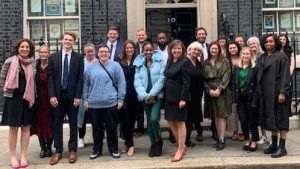
Today, I attended a roundtable at 10 Downing Street to speak about children and young people’s mental health and why it is so important.
This meeting was hosted by the Prime Minister and Gillian Keegan, the Minister of State for Care and Mental Health. Alongside this, I attended with Claire Murdoch NHS Mental Health Director, Professor Mina Fazel of University of Oxford, Dr Alex George, UK Youth Mental Health Ambassador, and youth mental health advocates and organisations including The Mix, SHOUT, YoungMinds, Mind and Place2Be.
Most importantly, this meeting was attended by brave and inspirational young people who spoke about their mental health experiences. I commend these young people for speaking so articulately and openly. Their words echoed what other young people have told me, in The Big Ask survey the largest-ever survey of children and young people.
It is vital we listen to children about their mental health and wellbeing
As Children’s Commissioner, listening to children and young people is my central role and priority. I am clear that it is vital that we listen to children and young people’s needs in this space. We must understand their thoughts and feelings about their mental health and wellbeing.
At the roundtable today, I shared what children told us in The Big Ask about their mental health and wellbeing. This survey took place during the pandemic, and despite these increased pressures at this time 80% of children told me that they are happy or okay with their mental health. However, 20% of children told me that they were not happy – and that they are struggling.
This group really matters to me – I want all children to be happy or content and to be to access support when they need it. So, I looked at the details behind those who were unhappy and found that:
- Mental health difficulties were particularly acute in older teenage girls – 40% were unhappy.
- Children from a vulnerable background were more likely to be unhappy with their mental health: around a quarter of children with a social worker and a quarter of young carers were unhappy with their mental health.
- Unhappiness with physical health, friendships, life at school, personal safety and family life were the strongest predictors of unhappiness with mental health.
Of this group of children and young people they spoke of the things that could have a negative effect on their mental health. These included being bullying, accessing harmful content on the internet, negative perceptions of body image, and being scared of failing to achieve the things we want.
We spoke about all these things in today’s roundtable. It was an important forum to speak about how important it is for children to have someone to speak to, how early intervention is crucial, and how wider support can be there for children and young people if they need access to Child and Adolescent Mental Health Services. I thank the young people there today for sharing their experiences and it was great to hear about the work the organisations attending did to support children and young people.





